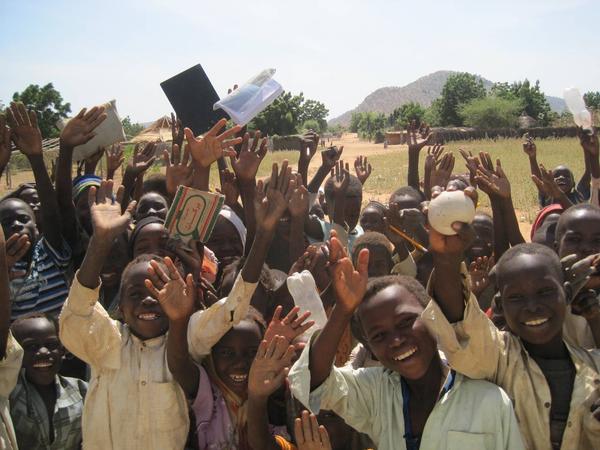
Editor's Note: This piece was originally published on Deseret News by Kate Bennion.
Someday, Rahma wants to return to his home country, which he fled after militia on horseback burned his entire village.
Why? So he can be president, of course.
A teenage Darfuri, Rahma is a refugee in Camp Djabal in eastern Chad, one of millions displaced from the Darfur conflict in western Sudan.
His presidential dream may be difficult to achieve — opportunities for refugees are typically bleak. Worldwide, the average refugee stays displaced for 17 years. If they do return to their homeland, they usually arrive years older, lacking the experience or skills necessary to build a new life. Children in refugee camps are especially at risk for recruitment as child soldiers or brides, and education programs are hard to sustain.
But Rahma has a school. What's more, he has friends in the U.S. — fellow students who support education in the refugee camps, thanks to innovative technology and a backpack of gear.
"Hi to all my friends of schools, how are you? Long time I never hear your joyful messages, I want to know your voice and what are you doing over there and your schools?" reads a post Rahma put on Pazocalo, a social media network built for Darfuris, advocates and students.
"Nowadays we’ve finish(ed) our holiday after five days of semester exam. We hope to continue study because we specially have (a) dream to change Darfur from the war and injustice to new Darfur."
Thanks to a collaboration between nonprofit groups i-ACT and Darfur Dream Team, students and educators in Chad and America are connecting through Pazocalo, building relationships and getting resources to further education in a remote, impoverished region — and developing a new generation of philanthropists at the same time.
"When you ask the (Darfuri) kids why are you in school? (They say) It will help me with my future; it gives me hope," said Olabukunola Williams, program manager for Darfur Dream Team in Washington, D.C. "Education is life-sustaining, not just life-saving."
How it works
Pazocalo resembles "a watered-down Facebook," but also boasts several innovations, according to Katie-Jay Scott Stauring, account project manager. Lots of white space and a simple, easy-to-navigate interface serves dual purposes: ease and cost-effectiveness.
"It's really developed for someone with low rates of literacy and no computer skills at all," says Stauring. "They don't have to navigate a desktop — it's developed for communities who don’t have knowledge of technology in general."
After logging in, users (students and teachers in the camps and at American "sister schools," as well as i-ACT volunteers) can create public posts, upload photos and videos (which are automatically compressed to save on satellite costs), leave comments and send individual messages.
Posts range from thank-yous to videos of soccer tricks and songs, classroom visits, camp projects and even videos of burning houses. American and Darfuri students ask each other what holidays they celebrate and what the weather is like.
At New Los Angeles Charter School, teacher Dan Thalkar came across the project while looking for a "connection with what's happening in the world" for a unit on human migration for his seventh-grade class. He signed up with the Darfur Dream Team.
In the first week of learning about Darfur and communicating with refugee kids who had fled the region, the students were already asking how they could help.
"(They said,) 'Why are you telling us all of this sad things when we can't do anything?’ ” said Thalkar. "They were already activists."
Read the full article here.
Photo: Kids at the Djabal refugee camp wave as school lets out for the day (Darfur Dream Team).

